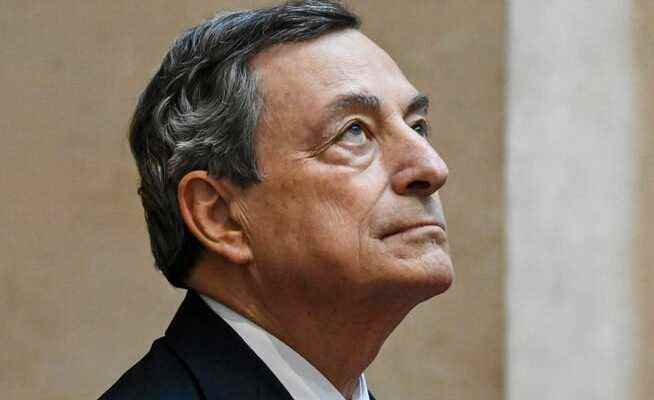The Italian head of government only wants to remain in office if there is a “new pact of trust”. A decision may be made in the evening.
According to his report in the Italian Senate, Prime Minister Mario Draghi wants to face a vote of confidence in the smaller of the two parliamentary chambers on Wednesday. The non-party ex-head of the European Central Bank wants parliamentarians to vote on a motion by Senator Pier Ferdinando Casini as to whether he should continue to govern. The vote of confidence could not come to an end until late in the evening.
Draghi calls for “Pact of Trust”
In his much-anticipated speech, Draghi previously explained the conditions under which he was willing to continue his work. It doesn’t need a “facade”, but “a new pact of trust,” he said on Wednesday morning in the small chamber. “Are you ready to redesign this pact?” he asked the parliamentarians and added: “You don’t have to answer these questions for me, but for all Italians.”
Agreement of the parties needed
There are four points on which there must be agreement, said Draghi: First, the implementation of the PNRR, i.e. the Italian reconstruction plan generously funded by the EU; second, a social agenda designed to cushion the impact of rising energy prices and the effects of inflation; third, the energy policy with which Italy wants to free itself from dependence on Russia; Fourth, the country’s foreign policy and its embedding in the EU, NATO and the G-7 as well as the continuation of the Ukraine policy, including arms deliveries.
His decision to resign last week was a “painful but right decision,” said Draghi. He is convinced that a head of government who has never stood for elections should have particularly broad support in parliament.
What triggered the crisis?
The trigger for the crisis was the lack of confidence in Draghi’s cabinet by the Five Star Movement, which was part of the governing body, when the Senate voted on a multi-billion dollar aid package. Although his government received the necessary majority even without the five-star votes, according to Draghi, the “pact of trust” had been broken. He then offered his resignation, but Mattarella refused and sent him to Parliament to justify himself. The Five Star Movement, shaken by the low polls and party resignations, then demanded that Draghi respond to their political demands. According to the media, another split could now be in the offing in the populist party led by lawyer Giuseppe Conte.
What does Draghi ask for?
It could be difficult for Draghi to reunite the old alliance of parties from left to right. He made participation by the Cinque Stelle a condition of any government under him to the end. She would be a counterweight in the cabinet to the strong populist Lega party led by right-wing politician Matteo Salvini. However, he and Silvio Berlusconi’s Forza Italia do not want to continue governing with Conte.
Hope rests on him: will Prime Minister Mario Draghi continue?
How are the parties reacting?
How the anti-establishment party will behave in the vote on Wednesday is unclear. Social Democrat leader Enrico Letta called on the movement to support the government. Observers see a crucial possibility in the split: Some Cinque Stella politicians could vote for Draghi, contrary to a possible party line of not voting. That way he would have the required backing of the Five Star Movement – and the centre-right could see them as breakaways rather than Cinque Stelle members.
More than a thousand mayors recently issued an open letter, as well as business representatives and associations, in favor of a continuation of the Draghi government. If an early election were to be held, Italy would hardly be able to act politically for weeks. Important reforms are pending, which the country with almost 60 million inhabitants must implement in order to receive important EU aid from Brussels. In addition, there is the budget planning, which traditionally leads to a lot of disputes in Italy and is sometimes only passed shortly before the end.
With agency material.
